Photographs: Aly Song/Reuters
Radioactive iodine -- exceeding the limit considered safe for infants -- has been detected in Tokyo's tap water amid mounting concerns over food safety in tsunami-hit Japan, which is struggling to contain an atomic crisis at its crippled Fukushima nuclear power plant.
The detection of high radiation was made at a water purification plant in the Japanese capital, prompting the Tokyo metropolitan government to issue a warning on Wednesday that babies should not drink tap water.
Tokyo authorities said infants in the central 23 wards, plus five adjacent cities, should refrain from drinking tap water, national broadcaster NHK reported.
Warning against eating leafy vegetables
Image: Wholesaler Haruo Shinozaki works at his shop in the Tsukiji fish market in TokyoPhotographs: Toru Hanai/Reuters
Premier Naoto Kan, meanwhile, warned consumers against eating leafy vegetables such as spinach harvested in Fukushima, as radioactive material far exceeding legal limits were found in vegetables in the region devastated by the March 11 earthquake of magnitude 9 and massive tsunami.
The disaster has killed thousands while many others are still missing.
Kan instructed Fukushima Governor Yuhei Sato to ask people, including the prefecture's own residents, to refrain from eating vegetables such as cabbage, the 'komatsuna' leaf vegetable, broccoli and cauliflower.
Food warning issued by Japan PM
Image: Tokyo's deserted Ginza shopping districtPhotographs: Toru Hanai/Reuters
The order, which is based on findings by the health ministry, will take effect "for the time being," government officials said.
This is the first time the government has issued a restriction on food intake to deal with the nuclear disaster in Japan, whose Pacific coast in the northeast was shaken again by strong earthquakes on Wednesday, including one measuring 6 on the Richter Scale.
Chief Cabinet Secretary Yukio Edano said the warning was issued by the prime minister as a precautionary measure and denied that radiation levels could pose an immediate risk to human health.
FDA bans imports
Image: Evacuees wait for food to be distributed at a shelter in Kesennuma, Miyagi PrefecturePhotographs: Damir Sagolj/Reuters
Seeking to allay growing concerns about food safety, Edano said Japan has a "strict safety standard" compared to other nations and will seek a "rational response" from them after explaining the facts.
Premier Kan asked Masaru Hashimoto, governor of Ibaraki, a prefecture bordering Fukushima, to suspend shipments of raw milk and parsley produced in his region.
The United States Food and Drug Administration said on Tuesday that it will ban imports of dairy products and vegetables from areas near the crisis-hit Fukushima nuclear power plant, citing "radionuclide contamination."
Black smoke rises from nuclear plant
Image: A woman looks at a list of victims and survivors at a shelter for victims in OtsuchiPhotographs: Damir Sagolj/Reuters
The measure will cover milk, milk products, fresh vegetables and fruit from Fukushima, Gunma, Ibaraki and Tochigi prefectures, the FDA said, adding the US will not allow imports unless they are confirmed safe.
At the troubled Fukushima nuclear power station, black smoke was seen rising again from the No.3 reactor, its operator Tokyo Electric Power Company said on Wednesday.
TEPCO said workers were evacuated from the No.3 and No.4 reactors after the smoke was first reported at 4:20 pm local time. However, no blaze was seen, Kyodo reported.
15,000 people still missing
Image: The date when the tsunami hit the Japanese coast is marked on a calendarPhotographs: Damir Sagolj/Reuters
Quoting the police, NHK reported that 9,408 people have been confirmed dead and nearly 15,000 are missing after the March 11 earthquake and tsunami that hit northeastern Japan.
A total of 5,714 of the victims died in Miyagi Prefecture and nearly 5,200 people are unaccounted for in the region. In Iwate prefecture, 2,875 people were confirmed dead and over 5,000 are missing.
In Fukushima Prefecture, 762 people died and nearly 4,500 are missing following the worst natural disaster in Japan since the 1923 Great Kanto Earthquake that claimed more than 100,000 lives.
Quakes hit Japan again
Image: People whose homes were destroyed by the tsunami take a bath in a tent set up by Japan's Self Defense Force in KamaishiPhotographs: Damir Sagolj/Reuters
Strong earthquakes jolted the Pacific coast of northeastern Japan on Wednesday morning, following which the Meteorological Agency issued warnings about the possibility of strong aftershocks, saying they could trigger more tsunami.
A quake of magnitude 6.0 jolted Fukushima prefecture at around 7:12 am local time, followed by a magnitude 5.8 tremor about 20 minutes later.
Authorities, meanwhile, estimated that the economic cost from the March 11 quake on seven affected prefectures would be up to 25 trillion yen ($309 billion) and warned that Japanese exports and industrial output could halt recoveries due to the disaster.

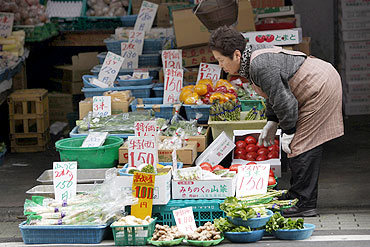
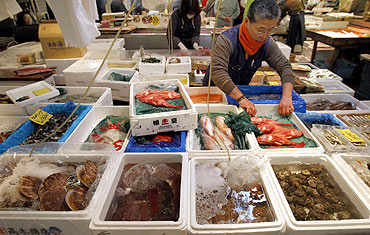
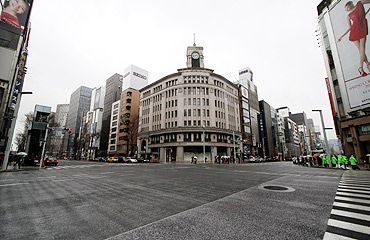
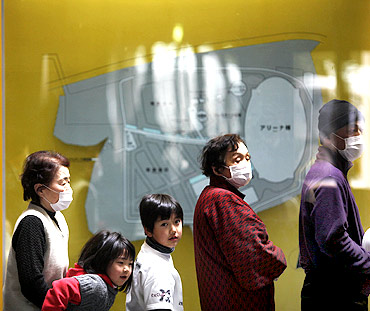
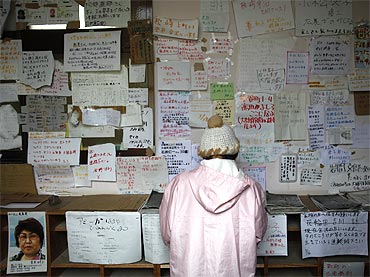
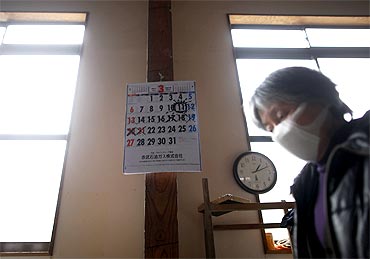
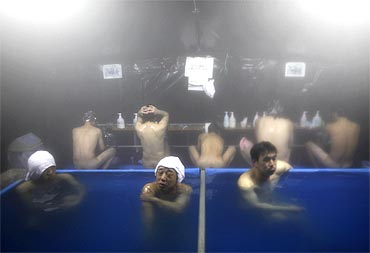
article